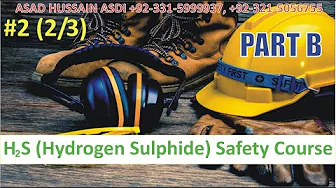IASP / NASP Crane and Derrick Safety Course In Pakistan (Rawalpindi, Peshawar)
IASP / NASP Crane and Derrick Safety Course
In the construction and industrial sectors, operating cranes and derricks is an indispensable task. However, it comes with significant risks if not handled with precision and expertise. To ensure the safety of workers and the efficiency of operations, the International Association of Safety Professionals (IASP) and the National Association of Safety Professionals (NASP) offer a specialized Crane and Derrick Safety Course. This course serves as a vital resource for individuals seeking to enhance their understanding and skills in crane and derrick operations while prioritizing safety measures.
Course Introduction:
The IASP/NASP Crane and Derrick Safety Course is designed to provide comprehensive training on the safe operation and management of cranes and derricks in various industrial settings. It covers essential aspects such as equipment inspection, load calculations, rigging techniques, and safety protocols compliant with industry standards and regulations. This course aims to equip participants with the knowledge and skills necessary to mitigate risks, prevent accidents, and promote a culture of safety in crane and derrick operations.
Course Benefits:
Enrolling in the Crane and Derrick Safety Course offers numerous advantages for both individuals and organizations:
- Enhanced Safety: Participants gain a thorough understanding of safety procedures, risk assessment, and accident prevention techniques, ensuring a safer work environment for everyone involved.
- Legal Compliance: By mastering industry regulations and standards, organizations can ensure compliance with legal requirements, reducing the risk of penalties or litigation.
- Improved Efficiency: Proper training leads to more efficient crane and derrick operations, minimizing downtime, optimizing productivity, and ultimately enhancing overall business performance.
- Career Advancement: Completion of this course enhances an individual's qualifications, opening up opportunities for career advancement and higher-paying positions within the industry.
- Risk Reduction: Through effective risk management strategies, organizations can significantly reduce the likelihood of workplace accidents and injuries, protecting both personnel and assets.
Study Units:
The Crane and Derrick Safety Course comprises a series of comprehensive study units covering essential topics related to crane and derrick operations. Some of the key study units include:
- Introduction to Cranes and Derricks: An overview of different types of cranes and derricks, their components, and their applications in various industries.
- Safety Regulations and Standards: Understanding relevant safety regulations, codes, and standards established by organizations such as OSHA (Occupational Safety and Health Administration) and ANSI (American National Standards Institute).
- Equipment Inspection and Maintenance: Detailed guidance on inspecting cranes and derricks for potential hazards, performing routine maintenance, and ensuring equipment reliability.
- Load Handling and Rigging: Techniques for properly calculating loads, selecting appropriate rigging equipment, and executing safe lifting and hoisting operations.
- Risk Assessment and Hazard Identification: Strategies for assessing risks associated with crane and derrick operations, identifying potential hazards, and implementing preventive measures.
- Emergency Response and Crisis Management: Procedures for responding to emergencies, such as equipment malfunctions, accidents, or natural disasters, and ensuring the safety of personnel and assets.
Learning Outcomes:
Upon completing the Crane and Derrick Safety Course, participants can expect to achieve the following learning outcomes:
- Comprehensive Understanding: Gain a thorough understanding of crane and derrick operations, including equipment functionality, safety protocols, and regulatory requirements.
- Improved Skills: Develop practical skills in equipment inspection, load handling, rigging techniques, and emergency response procedures, enhancing overall operational competence.
- Risk Management Proficiency: Acquire proficiency in risk assessment, hazard identification, and mitigation strategies, enabling proactive safety measures in the workplace.
- Legal Compliance: Ensure compliance with relevant safety regulations and standards, reducing the risk of regulatory violations and associated penalties.
- Safety Culture Promotion: Foster a culture of safety within the organization by prioritizing safety practices, communication, and continuous improvement initiatives.
Who is This Course For?
The Crane and Derrick Safety Course is suitable for a wide range of individuals involved in crane and derrick operations, including:
- Crane Operators: Professionals responsible for operating cranes and derricks in construction sites, manufacturing facilities, or industrial settings.
- Safety Managers: Personnel tasked with overseeing safety protocols, conducting risk assessments, and implementing safety measures in the workplace.
- Site Supervisors: Individuals responsible for managing crane and derrick operations on construction sites or industrial facilities, ensuring compliance with safety regulations and standards.
- Construction Workers: Employees involved in construction activities requiring the use of cranes and derricks, such as lifting heavy materials or erecting structural components.
- Safety Consultants: Professionals offering expertise and guidance in crane and derrick safety management to organizations across various industries.
Future Progression:
Upon completing the Crane and Derrick Safety Course, individuals may pursue further advancement in their careers through additional training, certification programs, or specialized courses. Some potential future progressions include:
- Advanced Rigging and Lifting Techniques: Specialized courses focusing on advanced rigging techniques, specialized lifting equipment, and complex load handling scenarios.
- Certified Crane Operator Certification: Obtaining certification as a certified crane operator through accredited organizations, demonstrating proficiency and competence in crane operations.
- Safety Leadership Training: Enrolling in leadership and management courses with a focus on safety leadership, communication, and organizational culture development.
- Occupational Health and Safety (OHS) Certification: Pursuing certification programs in occupational health and safety to expand knowledge and expertise in broader safety management principles.
- Continuous Professional Development (CPD): Engaging in ongoing professional development activities, such as workshops, seminars, and conferences, to stay updated on industry trends, best practices, and regulatory changes.
IASP/NASP Crane and Derrick Safety Course offers a comprehensive and indispensable resource for individuals seeking to enhance their knowledge and skills in crane and derrick operations while prioritizing safety. By mastering essential concepts, practical skills, and regulatory requirements, participants can contribute to creating safer work environments, reducing risks, and optimizing operational efficiency. Moreover, the course opens up avenues for career advancement and continuous professional development, ensuring that individuals remain at the forefront of safety excellence in their respective fields.
****** For Registration & Information ******
For Free Video Lectures Click Here











